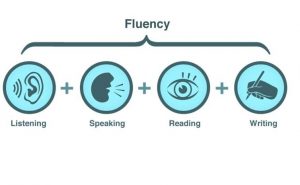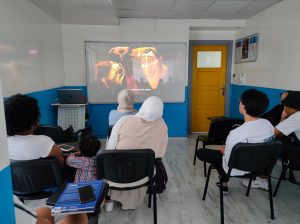FAQ
 We have compiled frequently asked questions about Turkish Courses, the Turkish Education System and Studying in Turkey.
We have compiled frequently asked questions about Turkish Courses, the Turkish Education System and Studying in Turkey.
You can contact us for detailed information.
In our course, we provide education in the modern conditions and at European standards as language proficiency.
We offer Turkish courses for all your needs with all native and fully experienced teachers in teaching Turkish for foreigners.
Our course and teachers are approved by the Turkey Ministry of Education.
We use Istanbul Turkish books in Turkish lessons.
Our students take lessons in four main language skills (listening, speaking, reading and writing) and sub-skills (grammar and vocabulary).

In addition to these lessons, we watch Turkish movies and TV series with our students.
We also organize various excursions and activities to practice more Turkish.


For many students; It may take about 3 months (Basic level) to be able to shop, go to the hospital, and solve their own problems in a simple way.
But it is important for our students who want to learn Turkish very well to continue their education for 8-9 months.
Turkish courses at Turkey Study Center have 5 levels*:
| A1 (Basic) | Can understand and use familiar everyday expressions and very basic phrases aimed at the satisfaction of needs of a concrete type. Can introduce him/herself and others and can ask and answer questions about personal details such as where he/she lives, people he/she knows and things he/she has. Can interact in a simple way provided the other person talks slowly and clearly and is prepared to help. |
| A2 (Basic) | Can understand sentences and frequently used expressions related to areas of most immediate relevance (e.g. very basic personal and family information, shopping, local geography, employment). Can communicate in simple and routine tasks requiring a simple and direct exchange of information on familiar and routine matters. Can describe in simple terms aspects of his/her background, immediate environment and matters in areas of immediate need. |
| B1 (Independent) | Can understand the main points of clear standard input on familiar matters regularly encountered in work, school, leisure, etc. Can deal with most situations likely to arise whilst traveling in an area where the language is spoken. Can produce simple connected text on topics which are familiar or of personal interest. Can describe experiences and events, dreams, hopes & ambitions and briefly give reasons and explanations for opinions and plans. |
| B2 (Independent) | Can understand the main ideas of complex text on both concrete and abstract topics, including technical discussions in his/her field of specialisation. Can interact with a degree of fluency and spontaneity that makes regular interaction with native speakers quite possible without strain for either party. Can produce clear, detailed text on a wide range of subjects and explain a viewpoint on a topical issue giving the advantages and disadvantages of various options. |
| C1 (Proficient) | Can understand a wide range of demanding, longer texts, and recognize implicit meaning. Can express him/herself fluently and spontaneously without much obvious searching for expressions. Can use language flexibly and effectively for social, academic and professional purposes. Can produce clear, well-structured, detailed text on complex subjects, showing controlled use of organizational patterns, connectors and cohesive devices. |
6 weeks.
You can see detailed information in the table below.
| When the classes are
begin and end? |
How many days
in a week? |
How many hours
in a week? |
How many hours will I take for
one level? |
How many weeks will
I take for one level? |
||
| Morning Groups | 09:30 – 13:05
(4 hours) |
5 days | 20 hours | 120 hours | 6 weeks | |
| Noon Groups | 13:30 – 17:00
(4 hours) |
5 days | 20 hours | 120 hours | 6 weeks | |
| Evening Groups | 17:15 – 19:50
(3 hours) |
5 days | 15 hours | 120 hours | 8 weeks |
Turkish courses at Turkey Study Center have 5 levels:
2 Basic levels (A1, A2);
2 Intermediate levels (B1, B2) and
1 Advanced level (C1).
Students learning Turkish are assessed to see their progress in four main language skills (listening, reading, speaking, and writing) and sub-skills (grammar and vocabulary).
The course is all 5 levels and takes 8 or 9 months depending on the holidays.
You can see detailed information in the table below.
| Question | How many levels are in the course? | How many months does the course take? | Which books do we use in the course? | Which nationalities the teachers will be? | Is there a weekend lesson or class? | How much should I pay if I pay the whole course fee? |
| Answer | 5 Levels (A1 -A2 – B1 – B2 – C1)200$ per level | 8 months | ISTANBUL Books | We work with experienced teachers who are native Turkish. | Yes we have free additional classes and speaking clup activities on Saturdays. | 900 USD |
225 USD (for 6 weeks / 120 hours)
You can see detailed information in the table below.
| When the classes are
begin and end? |
How many days
in a week? |
How many hours
in a week? |
How many hours will I take for
one level? |
How many weeks will
I take for one level? |
How much should I pay for this course? | |
| Morning Groups | 09:30 – 13:05
(4 hours) |
5 days | 20 hours | 120 hours | 6 weeks | 225 $ |
| Noon Groups | 13:30 – 17:00
(4 hours) |
5 days | 20 hours | 120 hours | 6 weeks | 225 $ |
| Evening Groups | 17:15 – 19:50
(3 hours) |
5 days | 15 hours | 120 hours | 8 weeks | 225 $ |
YES.
However, just like the TOEFL and IELTS procedure, you have to take an exam for Turkish.
We organize this exam and if you are successful at the end of the exam, you can get a Turkish certificate valid in all Turkish official institutions.
Apart from this, you can also get a certificate of attendance at the end of each course without an exam. But this document is only a document showing that you have attended the course and completed some levels.
In order to use it in your official works, we recommend that you take the exam and get a certificate as described above.
YES. All of our teachers are Turkish.
We do not think that anyone who speaks Turkish can be a “Turkish teacher” because they only know Turkish.
Our teachers speak Turkish as their mother tongue. In addition, we only work with teachers who graduated from the “Turkish Language Teaching” departments of universities.
Because we think that teaching Turkish to foreigners is an important specialty. For this reason, our main criterion is not only knowing Turkish but also knowing how to “teach Turkish”.
Sure.
Our teachers can also speak different languages, usually in English.
However, since Turkish is the “target language”, we do not find it appropriate to speak different languages in the classroom.
In addition, both our teachers and staff can help you in different languages, especially English, Arabic, Persian, but we take care to ensure that these help are outside the classroom 🙂
We come across this question all the time, but don’t worry. You will answer this yourself after only 1 week 🙂
Our classrooms have students from many different nationalities. Although English is generally accepted as a “common language”, we may have many students who do not speak English.
For this reason, we use Turkish as a common language after entering the classroom.
Because the target language is Turkish. Getting help with different languages is not a very suitable situation in terms of language learning.
After just 1 week, you will get used to taking Turkish lessons without any help.
We open new classes every 2 or 3 weeks.
To get the clearest information about the exact dates, you can call us at the phone numbers below or write to us via WhatsApp.
+90 555 887 54 74 (Whatsapp – English & Persian)
+90 544 887 54 74 (Whatsapp – English & Arabic)
This of course depends on your needs.
Each level in our course is 6 weeks (120 hours). You can study as much as you want.
For many students, it may take about 3 months (Basic level) to be able to shop, go to the hospital, and solve their own problems in a simple way.
But it is important for our students who want to learn Turkish very well to continue their education for 8-9 months.
Turkish courses at Turkey Study Center have 5 levels*:
| A1 (Basic) | Can understand and use familiar everyday expressions and very basic phrases aimed at the satisfaction of needs of a concrete type. Can introduce him/herself and others and can ask and answer questions about personal details such as where he/she lives, people he/she knows and things he/she has. Can interact in a simple way provided the other person talks slowly and clearly and is prepared to help. |
| A2 (Basic) | Can understand sentences and frequently used expressions related to areas of most immediate relevance (e.g. very basic personal and family information, shopping, local geography, employment). Can communicate in simple and routine tasks requiring a simple and direct exchange of information on familiar and routine matters. Can describe in simple terms aspects of his/her background, immediate environment and matters in areas of immediate need. |
| B1 (Independent) | Can understand the main points of clear standard input on familiar matters regularly encountered in work, school, leisure, etc. Can deal with most situations likely to arise whilst travelling in an area where the language is spoken. Can produce simple connected text on topics which are familiar or of personal interest. Can describe experiences and events, dreams, hopes & ambitions and briefly give reasons and explanations for opinions and plans. |
| B2 (Independent) | Can understand the main ideas of complex text on both concrete and abstract topics, including technical discussions in his/her field of specialisation. Can interact with a degree of fluency and spontaneity that makes regular interaction with native speakers quite possible without strain for either party. Can produce clear, detailed text on a wide range of subjects and explain a viewpoint on a topical issue giving the advantages and disadvantages of various options. |
| C1 (Proficient) | Can understand a wide range of demanding, longer texts, and recognise implicit meaning. Can express him/herself fluently and spontaneously without much obvious searching for expressions. Can use language flexibly and effectively for social, academic and professional purposes. Can produce clear, well-structured, detailed text on complex subjects, showing controlled use of organisational patterns, connectors and cohesive devices. |
You can find many options for Turkish course.
When choosing a course, only the price is asked, but this is a wrong point of view. Because there are some very important misconceptions that are not noticed in the first place.
For example:
How many hours are in the course for each level?
This is a very important issue. Because some courses deceive students by giving only 60-70 hours of lessons for 1 level. However, it is methodologically impossible to complete 1 level in 60-70 hours in a classroom environment.
In our course, each level is 120 hours and cannot be less than that.
Comments are very important. What are the thoughts of students who have learned Turkish before in the course?
Over the years we have received great feedback from almost all of our students. Those who learn Turkish perfectly, those who settled in the university of their choice with us, and others.
For reasons similar to these, choosing the right course is very important. Because with a wrong choice, both your time and money will be wasted.
One of the important criteria for choosing the right course is the experience and expertise of the course.
- How many years has he been teaching Turkish?
- Are the teachers Turkish?
- Is it accredited by the Ministry of Education?
There are many courses that teach in informal courses with foreign teachers whose native language is not Turkish. This would be a serious mistake and a real waste of time. Because the best way to learn a language is to learn it from native speakers. That’s why we always work with Turkish teachers who are graduates of Turkish Language Teaching in our course.
We would be happy to see you in our course with all our love and expertise 🙂
The most important and first rule:
Do not hesitate to make mistakes when speaking Turkish 🙂
Just like when learning any language, only courses and books are not enough when learning Turkish.
You can consider the gym example here.
All the materials are there, but if you do not do the exercises yourself, do not follow what the teacher says, or if you return to your normal life immediately after the sport, you will not be able to lose weight or develop muscles.
Just like that, your materials when learning a language are books and course.
In addition to these, you should;
- do your homework after the course
- use the new words you learn continuously throughout the day
- watch Turkish movies or TV series
- read Turkish books
- make Turkish friends
When you do all this, it won’t take long to realize that you learn much faster, speak much better, and get along with people much better than normal students 😉
Good luck!
Turkey is a top destination for International Students looking to study abroad. There are two types of universities in Turkey. Private Universities and Public Universities. With more than 70 private universities Turkey offers its student a broad catalog of universities.
For studying at private universities you can apply through our application form. With our application form, you can easily apply to multiple universities in Turkey by filling out one application form. The requirements and deadlines vary from university to university according to the subject. If you want detailed information we recommend you fill out our application form.
If you are looking for a Bachelor’s Degree in Turkey you have to have a high school diploma or being in the last semester of high school. These documents are needed for admission at a Bachelor Program in Turkey:
- High School Diploma (if possible)
- High School Transcript (Your grades at High School)
- Passport
- Photograph
- Motivation Letter (if needed)
For a Master’s Degree there are different requirements for different programs. By making your applications, there are common documents that are needed.
- Bachelor’s Diploma
- Bachelor’s Transkript
- Passport
- Photograph
- 1 Reference Letter
- Motivation Letter
- CV
You may submit your notarized documents via mail. You will be contacted as your files are processed.
Important for foreign students to remember is that they must get a student visa from the Turkish Embassy in their country, as they cannot get one in Turkey.
International candidates, in case of their admission, must obtain a Student Visa from their home countries, prior to their arrival in Turkey, in order to be enrolled at Turkish University. They should apply to the nearest Turkish Consulate or the Turkish Embassy. Tourist visas are not accepted.
Generally, the teaching language at Turkish universities will either be in English or in Turkish.
You can if your current university is recognized in Turkey. All common courses will be transferred after the evaluation process of the University.
Conditional Acceptance Letter
A Conditional Acceptance Letter states that you are conditionally accepted by the university. After completing your deposit payment, you receive the Official Acceptance Letter. Your application will be reviewed within 2 weeks. After approval, the conditional acceptance letter will be sent to your email as proof of your application is conditionally accepted.
Official Acceptance Letter
An acceptance letter is a document that confirms that you are officially accepted by the university. You receive this letter when your deposit payment is confirmed
Yes, you can. International students can work in Turkey after graduation. Especially since they have graduated from Turkish universities which increases their chances of landing a job after graduation. However, learning the Turkish language will be a plus for them and will increase their chances of finding their desired job.
All Turkish universities are supervised by the Higher Education Council (Ministry of Higher Education) of Turkey (YOK). YOK and Turkish universities participate in the Bologna Process, the European Union program which seeks to coordinate academic standards among 47 countries. Equivalency for each country is usually determined by that country’s specific educational authority.
The language of instruction at many Turkish universities is English. Erasmus exchange students and exchange students whose native language is English do not need to provide any documentation, however students whose native language is not English need to provide proof of English proficiency. Some universities require a minimum level of proficiency in one of the internationally recognized languages or entrance examinations (TOEFL, PTE, SAT, etc.), while other universities administer their own academic English language exams.
